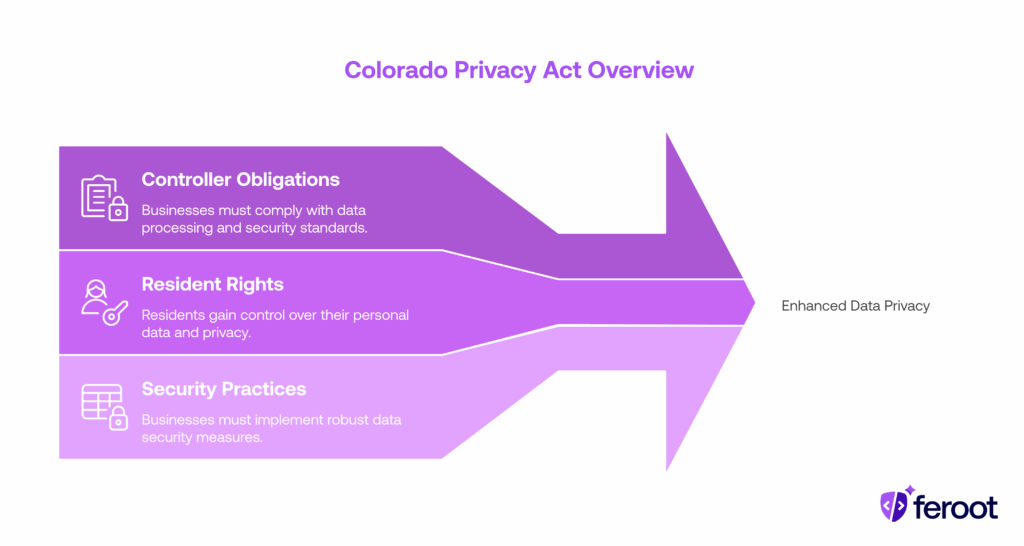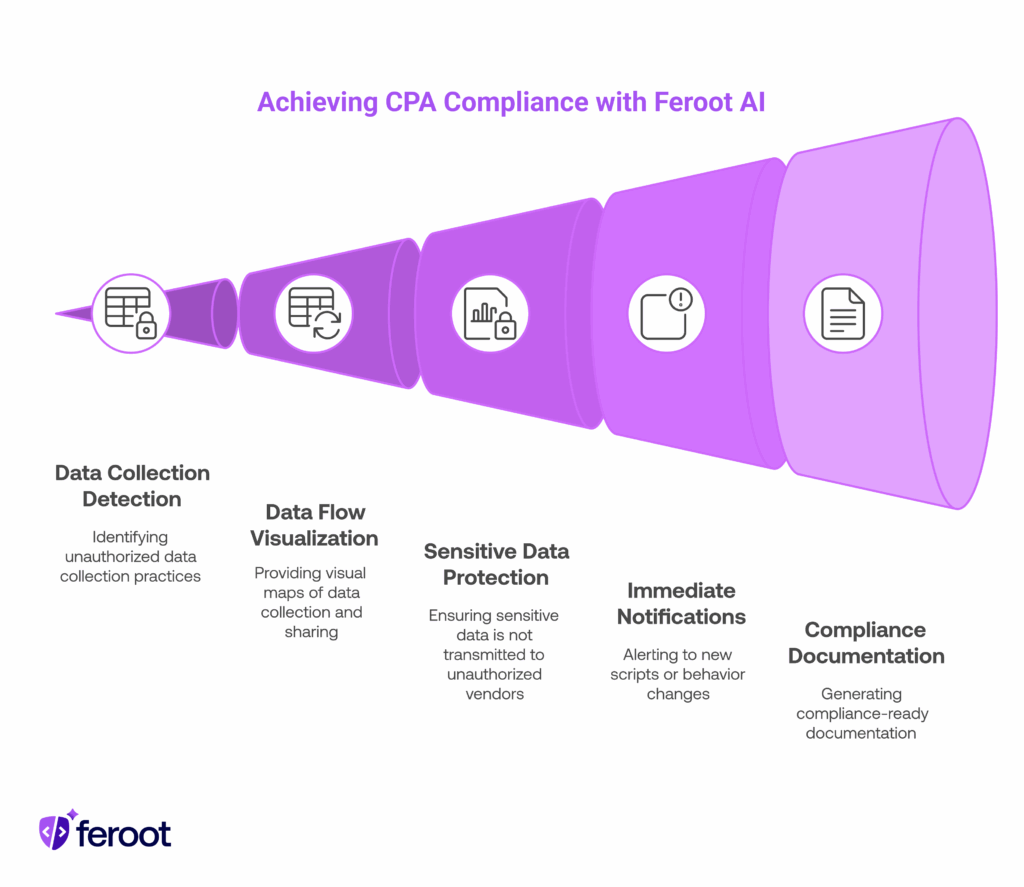TL;DR
- What it is: The Colorado Privacy Act (CPA) is a comprehensive state privacy law that regulates how businesses collect, use, and share personal data of Colorado residents.
- Why it matters: Effective July 1, 2023, the Colorado Privacy Act grants individuals rights over their data and requires businesses to ensure transparent, secure processing.
- Who it applies to: For-profit organizations conducting business in Colorado that process data of 100,000+ residents annually, or profit from selling personal data of 25,000+ residents.
- How Feroot helps: Feroot protects client-side data collection, monitors third-party scripts, and provides real-time visibility and reporting to meet Colorado Privacy Act obligations.
Introduction: Does the Colorado Privacy Act Apply to My Business?
If your website or digital app collects, tracks, or sells data from Colorado residents, chances are the Colorado Privacy Act (CPA) applies to you. Like California’s CCPA and Virginia’s VCDPA, the CPA is part of the growing patchwork of state-level privacy laws reshaping how U.S. businesses handle personal data.
Yet many companies underestimate the scope of the Colorado Privacy Act—or assume compliance is covered by PCI DSS or HIPAA if they process payments or healthcare data. The reality is that the Colorado Privacy Act adds unique requirements around consent, consumer rights, and third-party vendor accountability that these other frameworks don’t cover.
This is where Feroot comes in. By focusing on client-side visibility and control, Feroot helps businesses avoid hidden compliance risks lurking in scripts, pixels, and trackers—going far beyond the traditional back-end security stack.
What Is the Colorado Privacy Act (CPA)?
The Colorado Privacy Act (CPA), passed in 2021 and effective July 1, 2023, is enforced by the Colorado Attorney General and district attorneys.
It:
- Applies to controllers (businesses) that process data of 100,000+ Colorado residents annually, or derive revenue from the sale of personal data of 25,000+ residents.
- Grants residents rights to access, correct, delete, and opt out of targeted advertising, data sales, and profiling.
- Requires businesses to implement reasonable security practices, conduct data protection assessments, and limit collection to what is reasonably necessary.

Industries most affected include e-commerce, SaaS, healthcare, finance, ad tech, retail, and media—especially those reliant on client-side data collection and third-party services.
Key Compliance Requirements Under the Colorado Privacy Act
The key compliance requirements under the Colorado Privacy Act are as follows:
- Consent for sensitive data processing (Section 6-1-1308)
- Right to opt out of targeted advertising, profiling, and data sales (Sections 6-1-1306–1307)
- Transparency and privacy notices explaining categories of data collected and shared (Section 6-1-1308)
- Data protection assessments for high-risk processing activities (Section 6-1-1309)
- Vendor and processor accountability with clear contracts and monitoring (Section 6-1-1305)
- Security safeguards to protect against unauthorized access, including third-party risks (Section 6-1-1308(5))
Common Compliance Failures
Even businesses with strong security programs often fail CPA compliance because of client-side blind spots:
- Unmonitored third-party scripts: Ad networks, tag managers, and pixels that collect personal data without proper notice or consent.
- Shadow data flows: Consumer information flowing to unknown vendors through embedded scripts.
- Inadequate proof of compliance: Lack of audit-ready records showing how consumer requests were honored or what data was collected where.
In 2024, the Colorado Attorney General issued multiple warning letters to organizations failing to provide sufficient opt-out mechanisms and disclosures—highlighting that enforcement is already underway.
How Feroot Helps You Meet CPA Compliance
Feroot AI addresses the client-side risks most likely to cause CPA violations:
- Maps and monitors every script on your site, including third- and fourth-party scripts.
- Detects unauthorized data collection that could violate CPA consent and disclosure rules.
- Provides visual maps of how personal data is collected and shared.
- Makes it easy to confirm whether sensitive or children’s data is being transmitted to unauthorized vendors.
- Immediate notifications when a new script appears, changes behavior, or exfiltrates data.
- Supports compliance with Section 6-1-1308(5) requiring reasonable safeguards.
- Generates compliance-ready documentation of data flows, script activity, and consumer request handling.
- Helps demonstrate accountability during Colorado AG investigations.
With Feroot, organizations gain continuous visibility and enforcement of data practices across their digital properties—ensuring CPA compliance doesn’t fall apart on the front end.

FAQ
What are the penalties for violating the CPA?
Violations can result in civil penalties of up to $20,000 per violation, enforced by the Attorney General or district attorneys.
Does the CPA apply to websites that use third-party trackers?
Yes. If trackers process personal data of Colorado residents, your business is accountable for those data flows under the CPA.
Can script monitoring help with CPA compliance?
Absolutely. Script monitoring ensures third-party code doesn’t undermine consent management, data minimization, or opt-out rights.
How can I prove to auditors that my site is secure?
Feroot’s reporting and audit logs provide evidence of monitoring, safeguards, and compliance with CPA obligations.
What tools are available to detect unauthorized third-party data collection?
Feroot AI is designed to detect, map, and alert on unauthorized data access in real time.
Conclusion
The Colorado Privacy Act raises the bar for data privacy in the U.S.—demanding transparency, consumer choice, and strong data protection practices. While many organizations focus on backend compliance, the real risks often lie in the client-side scripts that drive modern digital experiences.
Feroot’s client-side security platform helps you see and control these blind spots, enforce data minimization, and document compliance—ensuring you’re prepared for Colorado regulators and consumer expectations alike.


